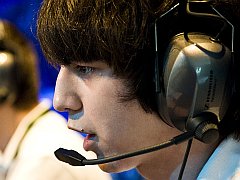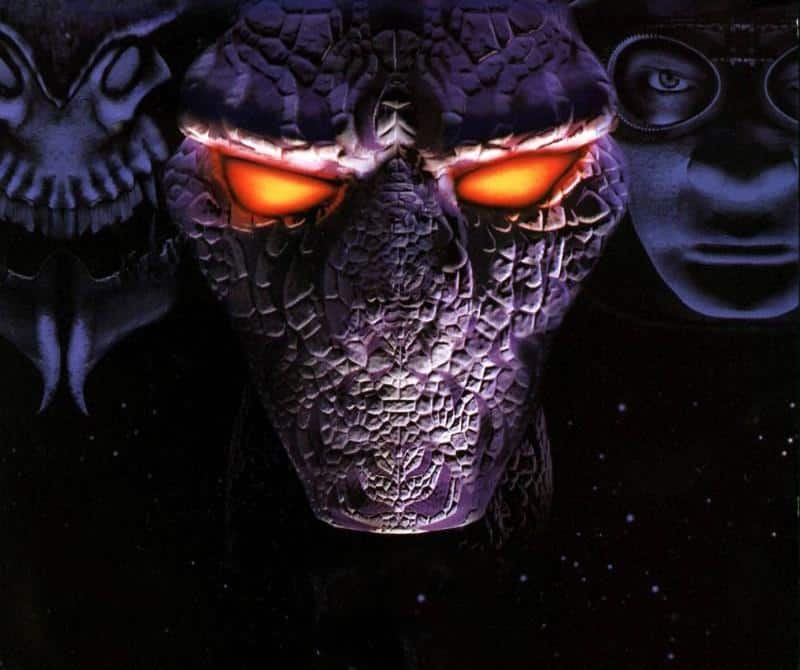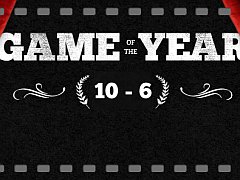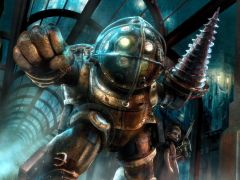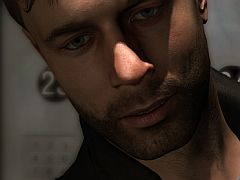You can trust VideoGamer. Our team of gaming experts spend hours testing and reviewing the latest games, to ensure you're reading the most comprehensive guide possible. Rest assured, all imagery and advice is unique and original. Check out how we test and review games here
It was an unusual, but memorable sight. Grubby, perhaps the best Warcraft III player outside South Korea, is running across the pristine KOMED MediaPark in Cologne, Germany, holding a giant white cheque above his head. The Dutchman, at 22-years-old considered a veteran by his peers, is using the $2,000 cheque he’s just won for finishing runner-up at the Warcraft Regional Finals 2009, to protect himself from a summer downpour. Most people use umbrellas, or, at a push, a newspaper. Not Grubby.
Half an hour ago, Grubby lost a nail biting Warcraft III: The Frozen Throne grand final to 17-year-old Spaniard LucifroN. It was an unexpected result. The less-experienced player took two games in a row after Grubby had won the opening match. Cue a dazzling flash of cameras, a nervous smile and a cool $5,000 cheque, presented to him on stage by none other than Blizzard’s World of Warcraft head honcho Tom Chilton. Perhaps that’s why Grubby was making a speedy exit. That loss cost him $3,000.
Still, both players, and the third-placed Russian Nicker – equally baby-faced – booked their tickets to the Global Finals at BlizzCon this August. The annual event, due to be held at the Anaheim Convention Center in California, is where the real money is. There, the overall winners of the Warcraft III and World of Warcraft Arena tournaments will pick up an eye-watering $25,000 each.
With that amount of cash on offer, not only at this Blizzard-organised event but at others dotted around the US and Europe, you’d think pro-gaming would be in rude health. Indeed in recent years, electronic sports (eSports) has attracted sponsorship, media coverage and fan following unimaginable only a decade ago. This upsurge in popularity is in part fuelled by the internet, which allows players to watch the best players battle it out at tournaments via live feeds, accompanied by “shoutcasts” from commentators and expert players. At the Cologne Regional Finals 09, the online audience peaked at 15,000, the kind of crowd you’d expect on the centre court at Wimbledon.
There is a feeling, however, that, outside Asia, e-sports’ popularity is declining. In South Korea, StarCraft (that other Blizzard RTS) players are treated like David Beckham, earn £300,000 a year and date super models. In May this year Player Jae Ho ‘Moon’ Jang signed a contract for $473,037 to play WarCraft III, making the 22-year-old the highest paid player in the Korean e-Sports scene. Several of the best Chinese Warcraft III players were selected to be among those carrying the Olympic torch on its route to Beijing in 2008. So what’s holding eSports back in the west?
“There’s a stereotype right now of playing computers or spending time on the internet,” says LongWalk, 18, from New York. He finished first in the Warcraft III: The Frozen Throne tournament, winning $5,000 and a seeded spot at BlizzCon 2009. “There’s a different social group and in popularity that social group is at the bottom. Until people can see video games as a valid source of entertainment I don’t think it’s going to become as huge in the US.”
/https://oimg.videogamer.com/images/917e/esports2.jpg)
The idea that gaming is still not accepted as a valid sport is something SonKiE, 19, from Pennsylvania, USA, who finished runner up in the Warcraft III: The Frozen Throne tournament, winning $2,000 and a place at BlizzCon 2009, agrees with. “It’s people’s attitude, mainly. People aren’t as accepting. They’re like, okay you practice this game four hours a day, that’s insane. Why do you do that?”
Part of the problem seems to be that gaming as a spectator sport is hamstrung by itself – unless you actually play the game that’s on show it’s hard to understand exactly what’s going on and, as a result, feel any connection to the action.
“That’s a great point,” LongWalk says. “Games like Counter-Strike are really popular in the US. Americans know what people shooting each other looks like. It’s good entertainment. But games like Warcraft – especially older generations it’s going to be very difficult to convince them that animated characters are going to be valued entertainment. Even if they knew the skill behind it – I feel like they would respect the skill, but they still wouldn’t want to watch it at this point.”
Perhaps in an effort to combat this, organisers of eSports tournaments employ commentators to describe the action in “shoutcasts”. And yet the terminology used during shoutcasts is bamboozling to all but the hardcore players. The sheer speed of the action, and the abbreviations used, seem to be the main stumbling blocks. RMG (Rogue, Mage, Priest) is a popular class formation for a three man WoW Arena team. CCs, DOTs – this is in-game lingo at its most difficult.
From Blizzard’s point of view, while it’s perfectly willing to fund tournaments and attract the best players with serious cash, it’s aware of eSports’ mainstream limitations, and admits that people who don’t play its games are unlikely to watch them being played.
“It’s very hard to appreciate what’s going on unless you’re familiar with the game,” says Tom Chilton, World of Warcraft’s game director. Is it just the nature of the MMO/RTS beast? “I think so,” Chilton says. “That’s even the case to a degree with major sports. Last night I was watching the Brazil against South Africa soccer game on TV with my fiancée. She knows very little about soccer. It was the same kind of thing, where somebody who doesn’t play WoW, if they came and watched they wouldn’t know what was going on and wouldn’t understand why it was cool and interesting. It was very hard for her to appreciate and be interested in that because she pretty much knew nothing about soccer.
“Of course as I explained more and more to her it became a little bit more interesting, but somebody had to be there to explain it. Ultimately soccer is intended to be a viewed sport, a sport that is fun to watch, whereas we never created WoW with that in mind. We even have that additional gap to overcome.”
/https://oimg.videogamer.com/images/3420/esports3.jpg)
So, what’s to be done? Is it simply the case that, in the west at least, eSports will never burst into the mainstream, as it has in Asia?
Not so, suggests LongWalk. “Companies like DIRECTTV are picking up and sponsoring World Cyber Games (WCG) events,” he says. “They’re giving these people more exposure. DIRECTTV is not just a gamers’ market, it’s everybody. If some company started trying to get game tournaments in public media, everyone could get a tiny glimpse of it. It just needs to get more and more exposure and big companies have to pick it up. It is very lucrative. Intel and Microsoft wouldn’t be doing it every year for no reason.”
Talking to the players, commentators and even Blizzard itself at the Regional Finals in Cologne, eSports comes across as a phenomenon still in its infancy. It feels as if, at least where Blizzard’s games are concerned, that the scene is made up of young people who consider it a wonderful bonus but nothing more. No-one at the Cologne tournament, and remember it was made up of the best World of Warcraft and Warcraft III players from across Europe and the US, is a full-time professional gamer. Well, apart from Grubby, perhaps.
“I view it as a really cool addition to playing a video game,” says LongWalk. “It would be nice to make a living out of this. Personally I don’t think I would have confidence in eSports too much at this point to do it. I’m going to a really nice college right now. I feel like I have a nice future and this is just a really fun hobby that I’ll be able to look back on and say, wow you did a really great job, you impressed a lot of people. I’ll be happy with that.”
“There’s just not enough financial support from teams,” SonKiE says. “There are not enough tournaments to live off of it. You’d have to win every one in first place over and over in order to live off of it. It’s pretty difficult. I wouldn’t bank on making that money to pay the bills. But for a hobby it’s pretty good.”
There are some that are perfectly happy with eSports just the way it is. James Harding, 26, from the UK, is an eSports commentator for the Electronic Sports League (ESL). He was the most successful UK gamer for four consecutive years, and was the first ever professional World of Warcraft player. He questions whether eSports needs to break out into mainstream western culture at all.
“Our objective is to keep it stable and growing at its natural pace,” he says. “Some people have come in and tried to apply business models similar to the NFL and other tournaments, but in all fairness it’s come where it has over ten years through the community’s choice of where the passion’s gone.
“I believe that if we just let it continue, it doesn’t have to take over the world by any means. It just has to appease the gaming industry.”
/https://oimg.videogamer.com/images/c3a3/esports4.jpg)
Blizzard’s view? As the company that’s created perhaps the most popular games in the eSports arena, it obviously considers it important (it handed out approximately $200,000 prize money at BlizzCon 2008), but it admits its priorities lie elsewhere.
“It’s important because driving and supporting the competitive community gets a lot of people interested and involved in the game when they wouldn’t do otherwise,” Chilton explains. “As a player it’s fun to watch the top players in the world duke it out and see what happens. It’s not core focus for Blizzard, it’s just a cool part of what we do. One of our major philosophies to developing games is we want our games to be easy to learn but hard to master. So it’s really important to support that hard to master part. Even though it’s a smaller and more hardcore part of the community, it’s still important.”
Like so many industries, eSports’ stifled growth can in part be blamed on the global recession. And, like so many industries, the truth of the situation probably lies somewhere in between those that say it’s going to take over the world, and those who reckon it’s going to die a painful death. With Blizzard’s own StarCraft II, the sequel to perhaps the most popular competitive video game of all time, due out on PC soon, an e-Sports upsurge is not inconceivable. Indeed the playable build of the game on show at the Cologne Finals perhaps drew bigger crowds than the tournament itself.
For players like Grubby, however, such thoughts are far from the mind. With a $2,000 cheque in tow and a plane ticket to BlizzCon 2009 secured, it’s practice time. Like LongWalk, and SonkiE, the green is hard to resist. Just think how big that $25,000 cheque will be…
